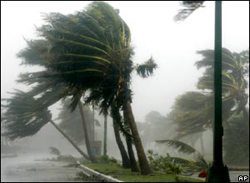The number of large corporations reporting current risks from climate change has grown substantially over the last two years.
According to a survey of 405 of the biggest global companies conducted by the Carbon Disclosure Project, 37 percent say they are already seeing the impact of climate change on their business — up from 10 percent in 2010.
The Carbon Disclosure Project attributes the increase in companies worried about current climate risks to the rise in extreme weather globally:
Recent extreme weather and natural events have tested companies’ business resilience and increased their level of understanding of the timeframes of the physical risks they associate with climate change. Physical risks are viewed as tangible and present, impacting companies’ operations, supply chains and business planning. The majority of companies (81%) report physical risks and the percentage of companies that view these risks as current has nearly quadrupled from 10% in 2010 to 37% in 2012. Insurance company Allianz reports that in 2011 it processed $2.2 billion in natural catastrophe (including non-weather related) claims, the largest sum for natural catastrophes in its history.
So far this year, America has seen the most extreme period for weather ever recorded. The country is on track to surpass last year, when there were 14 extreme weather events that each caused more than a billion dollars in damage — the most in U.S. history.
In response to these tangible impacts, more large companies are crafting strategies for addressing climate change. According to the survey, 78 percent of responding companies are factoring climate into their business plans, up from 68 percent in 2011.
The reaction from corporations is similar to those seen among individuals: Polls show that as people see the impact of extreme weather first hand, they’re far more likely to say they understand the climate is changing due to human activity.
“Business and economies globally have already been impacted by the increased frequency and severity of extreme weather events, which scientists are increasingly linking to climate change,” wrote Paul Simpson, CEO of the Carbon Disclosure Project. “It is vital that we internalize the costs of future environmental damage into today’s decisions by putting an effective price on carbon.”
The Carbon Disclosure Project is a group of hundreds of financial institutions and corporations worth $78 trillion that have pledged to release data on their greenhouse gas emissions and implement reduction strategies.
This latest survey shows yet again how private companies are taking action to address the problem, while politicians in Washington debate whether the problem even exists. Last year, a group of investors worth $20 trillion in assets called climate action the foundation of “long-term economic growth” that will “present significant opportunities for investors in areas such as cleaner and renewable energy, energy efficiency and decarbonisation.”
Investor support for addressing climate change has doubled in the last three years – growing from 150 investors managing $9 trillion in assets to today’s 285 investors with $20 trillion.
This article was originally published on Climate Progress – thinkprogress.org/climate. Reproduced with permission.











